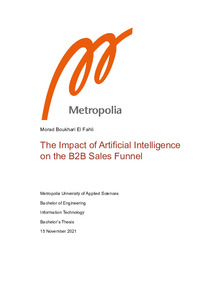The Impact of Artificial Intelligence on the B2B Sales Funnel
Boukhari, Morad (2021)
Boukhari, Morad
2021
Julkaisun pysyvä osoite on
https://urn.fi/URN:NBN:fi:amk-2021112220985
https://urn.fi/URN:NBN:fi:amk-2021112220985
Tiivistelmä
The fourth industrial revolution, fueled by the emergence of technologies such as virtual reality, the Internet of Things, blockchain, and artificial intelligence, is profoundly impacting the way we live and work. Catalyzed by an increase in computing power and the proliferation of available data, artificial intelligence, one of the most disruptive forces of the twenty-first century, has experienced dramatic progress in recent years and promises far-reaching implications in the global economy and society at large. The implications of artificial intelligence will not only be evident across industries but also across most business functions, with the greatest potential value impact being on sales and marketing. Artificial intelligence is certainly changing the way people interact with businesses, buy products and services, and also how organizations promote and generate demand for their offerings.
The main objective of this thesis is to examine existing artificial intelligence technologies and techniques and analyze their current implementations in B2B sales operations. This study is based on existing research and literature and aims to contribute to the body of knowledge by connecting artificial intelligence solutions to the challenges sales professionals experience at each step of the sales funnel. The sales model proposed by Dubinsky is used to represent the sales funnel.
The study reveals that machine learning and natural language processing are currently playing crucial roles in the sales process, helping sales professionals with data-driven decision making and allowing them to provide a better customer experience. The sales activities that are being enhanced by the use of artificial intelligence include lead generation, sales forecasting, lead qualification, and customer communication. The lack of large historical datasets to train machine learning models and concerns around privacy and security are some of the challenges faced by AI-powered sales organizations.
The main objective of this thesis is to examine existing artificial intelligence technologies and techniques and analyze their current implementations in B2B sales operations. This study is based on existing research and literature and aims to contribute to the body of knowledge by connecting artificial intelligence solutions to the challenges sales professionals experience at each step of the sales funnel. The sales model proposed by Dubinsky is used to represent the sales funnel.
The study reveals that machine learning and natural language processing are currently playing crucial roles in the sales process, helping sales professionals with data-driven decision making and allowing them to provide a better customer experience. The sales activities that are being enhanced by the use of artificial intelligence include lead generation, sales forecasting, lead qualification, and customer communication. The lack of large historical datasets to train machine learning models and concerns around privacy and security are some of the challenges faced by AI-powered sales organizations.
